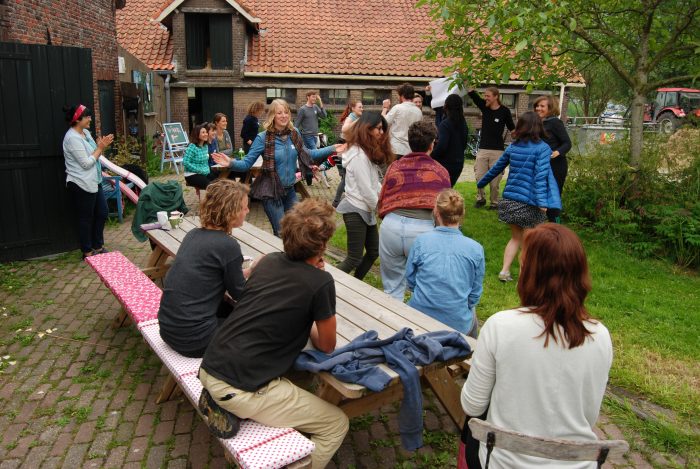For the second consecutive year, Toekomstboeren, FIAN Netherlands, Otherwise, TNI and ILEIA organised a training weekend, an inspiring exchange of alternatives to our current food system. This year, twenty-three participants from different walks of life and nationalities came together on Saturday the 11th of June to learn and exchange ideas about how to put food sovereignty in practice.
Like in 2015, the training weekend took place at the Dutch family farm Buitenverwachting. After a short introduction, our host, Corneel van Rijn, guided the group around his farm explaining how the farm works and sharing his views on agroecology. Buitenverwachting means “beyond expectation”, and the farm has been true to its name since, 1862: for over four generations, the farmers have worked on nature conservancy to maintain the biodiversity that sustains their land. This diversity is not only seen in the number of wild plants and animals, Buitenverwachting is a highly agrobiodiverse farm with 40 milk cows, rabbits, hens, pigs, goats, ducks and honey bees, as well as a vegetable garden.
Next, Hanny van Geel from the European Coordination Via Campesina introduced participants to agroecology and its political connections to the concept of food sovereignty, a term coined by the international peasants movement in 1996. In her presentation, she explained the importance of agroecology and food sovereignty for peasants; they challenge and transform structures of power in society and put the control of seeds, biodiversity, land and territories, waters, knowledge, culture and the commons in the hands of the people who feed the world. Hanny cautioned that agroecology as a concept is currently ‘at a crossroads’; many multilateral institutions, governments, universities and research centers, NGOs, corporations, now recognise agroecology, but often redefine the concept as a set of technologies that appear to ease the sustainability crisis of industrial food production. By co-opting the term, coorporations make sure the existing structures of power remain unchallenged.
Diana Quiroz from ILEIA introduced the global food sovereignty movement and the interactions between science and practice of agroecology. Diana started by explaining the important differences between the dominant discourse of ‘food security’ and the movement concept of ‘food sovereignty’; while food security emphasizes access to adequate nutrition for all, it does not question where and how the food was produced. Instead, food sovereignty, as defined by the worldwide peasant’s organization La Via Campesina, goes a step further by saying that “the people who produce, distribute, and consume food should control the mechanisms and policies of food production and distribution, rather than the corporations and market institutions they believe have come to dominate the global food system”. After Diana’s presentation, participants split up in working groups to act out what they as individuals could become part of the food sovereignty movement.
Boaventura Monaje from Mozambique discussed the consequences of the agroindustrial food system in Africa, as well as how people unite themselves to resist it and build ‘food sovereign alternatives’. The rights and livelihoods of peasants are compromised by investors that eye their lands for export crops. Boaventura challenged the participants to shift their perspectives in a North–South learning exercise.
On Sunday morning, Henk Renting of the RUAF Foundation gave a talk about city region food systems and urban-rural relations. The bulk of the world’s population live in cities nowadays, therefore, rethink the relations between cities and the countryside is paramount for rebuilding our food systems. In the world café setting that followed, participants were divided in groups and spread around the farm garden to discuss four forms of food citizenship that have to do with urban rural linkages (grow, buy, cook/taste/eat and spoil/waste). The results of the brainstorm sessions were presented to the whole group afterwards.
The last speaker of the weekend was Sylvia Kay from TNI, who introduced the upcoming Nyéléni Forum in Romania in more detail and explained how people can get involved in the preparations for the delegation from the Netherlands.

